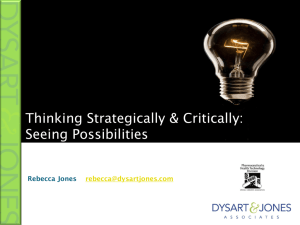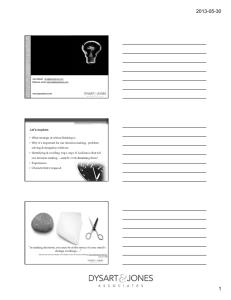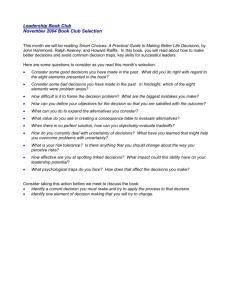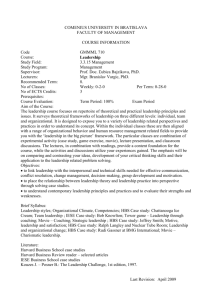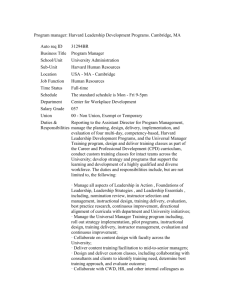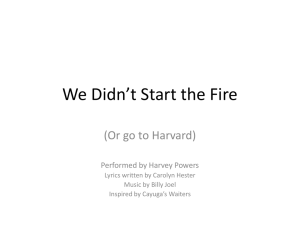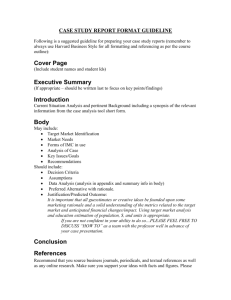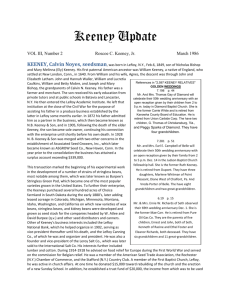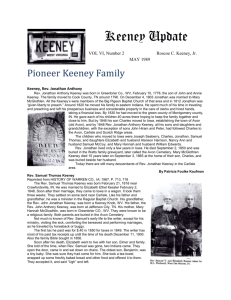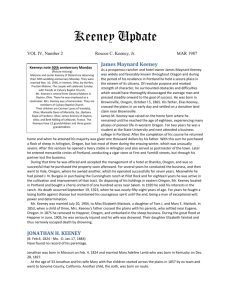The Art of Critical Thinking
advertisement
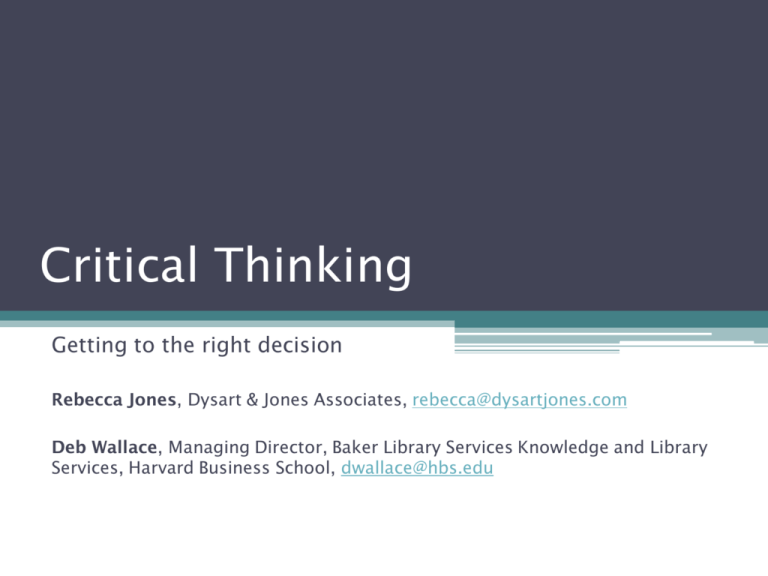
Critical Thinking Getting to the right decision Rebecca Jones, Dysart & Jones Associates, rebecca@dysartjones.com Deb Wallace, Managing Director, Baker Library Services Knowledge and Library Services, Harvard Business School, dwallace@hbs.edu Let’s explore: • What good critical thinking is • Why it’s important for our decision-making & problemsolving • Identify & avoiding traps, trips & landmines that foil our decision-making…..maybe even disarming them? • Harvard’s experience • Characteristics required www.dysartjones.com for slides & worksheets Deb Wallace & Rebecca Jones 5/28/2010 “in making decisions, you may be at the mercy of your mind’s strange workings….” Hammond, Keeney & Raiffa, The Hidden Traps in Decision Making, Harvard Business Review, January 2006 Critical Thinking: formal definition “ the intellectually disciplined process of actively and skillfully conceptualizing, applying, analyzing, synthesizing, and/or evaluating information gathered from, or generated by, observation, experience, reflection, reasoning, or communication, as a guide to belief and action.” Critical Thinking as Defined by the National Council for Excellence in Critical Thinking, 1987 A statement by Michael Scriven & Richard Paul at the 8th Annual International Conference on Critical Thinking and Education Reform, Summer 1987}. http://www.criticalthinking.org/page.cfm?PageID=766&CategoryID=51 Last accessed May 31, 2009 Critical thinking is really about • Decision-making & problem-solving • Openmindedness • Productive dialogue Implicit that we can’t make decisions alone or in a vacuum The decisions & problems we face are increasingly complex It’s hard, and it’s worth it Good Critical Thinking • Raises the right questions – clearly & precisely • Focuses on the real problem or decision to be taken • Gathers & assesses relevant information ▫ Uses abstract ideas to interpret info effectively • Develops well-reasoned conclusions & solutions, testing them against relevant criteria and standards • Relies on recognizing & assessing assumptions, implications, &consequences • Communicates effectively with others in figuring out solutions to complex problems Critical, not criticize Why? • For our customers • Designing meaningful services • For our organizations • Planning, negotiating, managing & relationship building • For ourselves, and our professional credibility • Aware & factor in our : • tendencies & assumptions • perceptions & selections based on conditioning, beliefs and desires, focus, emotions • reconstructive memory affected by time, what we want to remember, and after-acquired information and suggestion. • Confident in our: • knowledge • ability to reason Wake up call “Set in our ways” won’t move us forward “Naming” the process at first makes it legitimate to: Challenge usual practices Rethink what has been thought Expand the emphasis from short-term fixes to longterm fusion Common Decision Traps • • • • • • • • • • Framing Status quo Anchoring Sunk cost fallacy Information gathering traps Overconfidence bias Availability Confirmation bias Generalization False cause Based on the work of Michael B. Metzger, Kelley School of Business, Indiana University Framing • Put the frame up first ▫ May clarify status-quo, anchor & sunk-costs • The questions we ask very often determines the type answers we get To avoid this: • Don’t accept the first frame – or queston • “re-frame” or look at the issue from different perspectives, particularly from customer or stakeholder perspectives Status-quo • Like it or not, tendency is to perpetuate what we already know – like it or not • Psychologically risky ▫ “breaking from the status quo means taking action, and when we take action, we take responsibility, thus opening ourselves to criticism and to regret.” Hammond, Keeney, Raiffa To avoid this: • Focus on the real goals & ask how status quo helps move towards them • Evaluate vs. all other alternatives IN TERMS OF THE FUTURE ▫ Ask outsiders to review your evaluations Kennedy & Jones, 2009 Anchoring • What we hear or see first influences our subsequent thinking ▫ Past statistics & trends, an article, a colleague’s comment ▫ The order in which we receive info distorts our judgment To avoid: • Be aware • Purposefully use different starting points • As you gather other people to discuss the issue, try to limit the information you give them ▫ Clarity what each of your base assumptions are ▫ Keep coming back to the issue on which you are focusing Kennedy & Jones, 2009 Sunk cost • People want to justify past decisions, regardless of how present & future change the situation Some cultures reinforce this by punishing decisions that haven’t turned out as planned “When you find yourself in a hole, the best thing you can do is stop digging.” Warren Buffet To avoid: • Consciously set aside past investments ▫ a rational decision is based on current assets & future consequences • Stop “sinking” costs into “sunk” costs • Reward turn-arounds & “try’s” Kennedy & Jones, 2009 Reaching clarity means wading through confusion Know your own conflict handling style Assertiveness Competing Collaborating Compromising Avoiding Accommodating Cooperativeness Thomas-Kilmann Conflict Mode Instrument Mary Lee Kennedy 17 Harvard Business School’s experience We educate leaders who make a difference in the world. We support Harvard Business School’s mission by enabling the creation and exchange of ideas, expertise and information Strategic Shifts FY07 FY08 FY09 FY10 Integrate with Research Course Development 3 pilot MBA projects 34 projects Model developed Develop - 3 Revise - 2 Enhance - 31 10% Growth Focus MBA and Exec Ed Organize the School’s priority information Catalog books Socialize information management Catalog electronic information: Institutional Memory (IM) Information Lifecycle Management Program Complete IM and Centennial Assets Start Scholarly Assets Standards for SharePoint (Intranet) Scholarly Assets Intranet content governance Web content management Develop an enterprise Web service Ad hoc – mainly work for KLS iTRAC Governance Group reorganization and new hires 89 projects 74 projects Q1&2 Schoolwide Establish Intranet Program Office TBD Move to electronic products and services Status Quo 2.5X electronic vs. print expenditure First Knowledge Center – BBOP HC web properties 2.9X electronic vs. print Institutional Memory Agribusiness Knowledge Center OPM eBaker 2.9X electronic vs. print* Deliver products on SharePoint 2.3X electronic vs. print* Support Global Research and Education No Focus Alliance with CBS Network with European universities Relationship with HBS Research Centers Global databases added (China, India) Network with Chinese Universities and Harvard Launch GKEN – 40 Track global component of research support – 269 Q3 -1st sourcing in China Leverage GKEN Solidify relationships in China and Europe India? China Knowledge Center Increase reach of faculty knowledge dissemination Working Knowledge website and newsletter Working Knowledge for Exec Ed, Publishing, media WK moved to daily content Economic Crisis site Working Knowledge for Initiatives Alignment with Marketing Plan Redesign pending stakeholder analysis Exercising Good Judgment • • • • • Capability Development Modeling Best Practice Road Maps Performance Management Project Management ▫ Team Norms ▫ Opportunity Management ▫ After Action Reviews All Day; Every Day • • • • • • • • Customer Service Standards Service Delivery Agreements Customer Relationship Management Exceptions Management Strategic Alignment Employee Engagement Balanced Score Cards Job Descriptions/Work Designs Manage carefully – it’s new • Disagreement must be incited & managed ▫ Once conflict becomes too intense people shut down • Organizational culture must encourage questioning, especially of decision-makers’ assumptions & propositions Critical characteristics • Communication skills ▫ Listener • Self-awareness & selfacceptance • Curious, interested & questioning • Admits lack of valid information or understanding • Assesses & evaluates information & propositions for their value on the issue at hand What’s critical? • Awareness • Discipline your decision-making to uncover thinking errors & prevent judgment errors • Trying it If you’re interested, try: The Critical Thinking Community http://www.criticalthinking.org/articles/Open-minded-inquiry.cfm • Kramer, R. M., A. E. Tenbrunsel, and M. H. Bazerman, eds. Social Decision Making: Social Dilemmas, Social Values, and Ethical Judgments. Routledge, in press. • Bazerman, Max, and D. Moore. Judgment in Managerial Decision Making. 7th ed. John Wiley and Sons, Inc., 2008. • Milkman, Katherine L., Max H. Bazerman, and Dolly Chugh. "How Can Decision Making Be Improved?" Perspectives on Psychological Science (in press). Abstract • Raiffa, Howard, John S. Hammond, and Ralph L. Keeney. "The Hidden Traps in Decision Making." HBR Classic. Harvard Business Review 84, no. 1 (January 2006). • Hammond, John S., III, Ralph L. Keeney, and Howard Raiffa. Smart Choices: A Practical Guide to Making Better Decisions. Boston: Harvard Business School Press, 1998. (Paperback: Broadway Books, 2002; Thank you dwallace@hbs.edu rebecca@dysartjones.com
